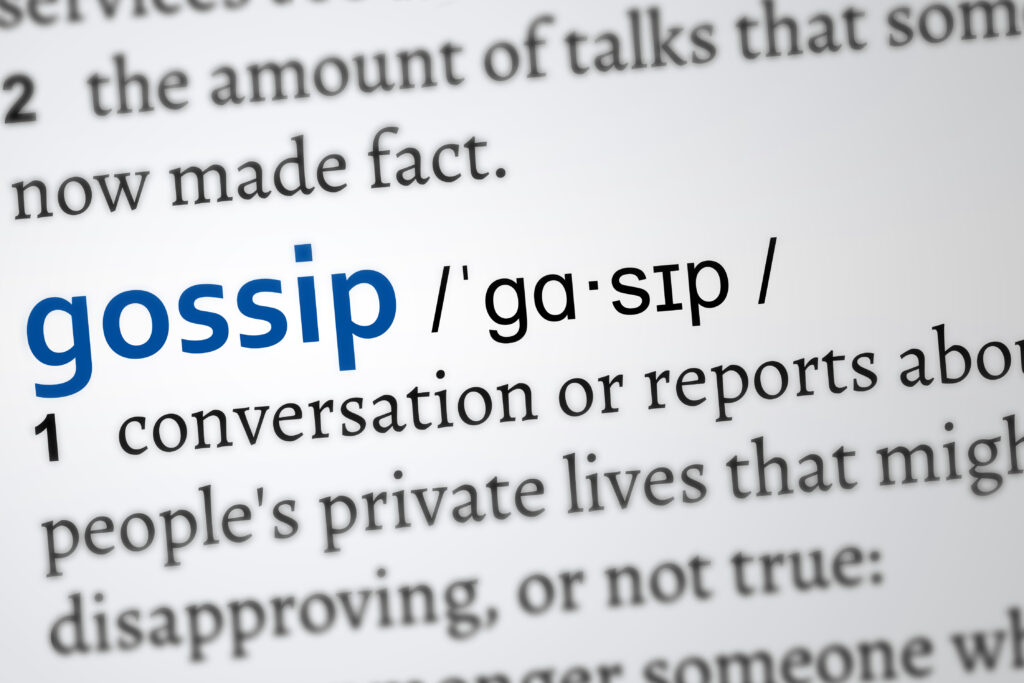From butt-dialling your boss to drunk debriefing with a glass of wine, we know it gets us in trouble but we simply can’t stop doing it. Psych-She delves into the reasons why gossip scratches an itch in our brain, and why we might not need to feel that guilty about it.
We’re constantly trying to do everything we can to make sure we’re not bad people, from treating people with kindness to smiling at strangers in the street. So far, we’re ticking all the nice girl boxes- apart from that we get a kick out of gossiping.
Something about it is so tempting and everyone does it (even those pesky people that say ‘God, gossiping is so toxic, that could never be me!’) and there must be a reason why it fills the room. We deny it, but when conversations die down, we instantly resort to unpacking the lives of everyone who is currently sleeping with their ex, has got questionable lip filler or has been turning up late to work for the past week, before uttering the classic closing line: ‘but who are we to talk’.
“Gossip can be used as a coping mechanism for uncertainty or worry. When talks stall, it offers a diversion”, says psychologist Sophie Cress, who believes that spilling the tea is beneficial for strengthening social bonds.
“By focusing on others, we take our attention away from ourselves and whatever discomfort we feel, making it a great conversation starter.”
“People discuss their thoughts about mutual friends and this requires both vulnerability and trust, strengthening relationships by encouraging mutual confidence.”
Side note- gossip doesn’t need to be negative to be juicy. We love gloating about the highlights of our life just as much.
Research by Social Neuroscience shows a relationship between gossiping and our prefrontal cortex which helps us navigate complex social behaviours (better known as the thing that doesn’t fully develop until we’re 25, according to TikTok). They found that it responds to self-related gossip, both good and bad, and increases linearly with pleasure when we’re speaking nicely about ourselves.
“There’s differences between the levels of gossip and this can change depending on a number of things including the content, setting and those spreading it” says Sophie.
“The type of information and its effect on the people involved determines how serious it is.”
Unfortunately, there will be times when we trip and fall into nasty gossiping, but everyone deserves a space to vent and seek validation when they’re pissed off, right?
“Me and a friend once got caught grumbling about another friend and she’d left her phone recording in a room we were all sitting in together while she left. That evening, she sent the conversation back to us” says Maria, a 21-year-old student.
“It’s a kick in the teeth getting caught, but at the same time I think that sometimes we need to get things off our chest, to prevent us from blowing up.”
If gossiping is situational, let’s talk about a place where we’re waiting for someone to strike up: in the workplace. Whether it’s because it passes the time or because we know that they’ve probably had their knives in our backs at some point and we’re gunning for revenge, it just hits different, doesn’t it?

20-year-old bartender Charlotte spills about a work gossip living hell: “I had my phone in my back pocket after I’d been showing my colleague some texts from my boss and I accidentally caught the call button”, she says.
“He answered, obviously not to my knowledge, and we had a conversation where we were laughing at him, mimicking him, ranting and he’d heard the entire thing. We only noticed because he’d sent me a follow up text.”
Sophie argues that if gossiping is advantageous anywhere, it’s at work. In cases less mortifying than Charlotte’s, it can be a ‘useful tool for discussing dynamics’- if someone misbehaves and it’s the talk of the town, others won’t make the same mistakes.
So why do we get post-gossip guilt? Even if we’ve not said anything that bad, we still leave the conversation panicking that bad karma is coming in truck loads.
“I freak out whenever I know I’ve been gossiping a lot, especially over text. It’s happened too many times where I’ve been bitching and sent the text to the wrong person” says 20-year-old Louise.
“Now, I obsessively check that my texts have gone to the right person, feeling guilty that i’ve done it in the first place.”
A study from the National Institute of Health found that amongst adults, negative gossip was associated with anxiety and low self-esteem.
“Spending a lot of time gossiping may impact someone’s mental health as it might cause feelings of regret and guilt. People may start to fear it will negatively impact their relationships” says Sophie.
“It can cause feelings of jealousy or resentment, constantly discussing other people’s lives may lead to individuals comparing themselves, leading to dissatisfaction with their own lives. This creates a cycle of negative self-talk and low self-esteem. Relationships can be strained as it ruins trust as well as the fear that sharing personal information may become gossip.”
Everyone knows a clumsy chin-wagger, who simply can’t help themselves and lets all the information they have been storing come tumbling out at the worst moments. Some psychologists feel this trait is more likely to cause low self-esteem than the act itself.
“I think whether you have high or low self esteem, you’re equally likely to do it. The only way the two would be linked is if you’re a bad gossiper” says Frank McAndrew, a social psychologist and author.
“Think of it as a social skill. If you’re a good gossiper you’re usually popular and people think you’re discreet so people trust you with information. Bad gossipers are the ones who say it in the wrong places, to the wrong people or do it in a self-serving way, leading to them becoming unpopular.”
Frank feels that tattling is in our factory settings, as we’re the ‘descendants of busy-bodies’.
“We are shaped by our ancestors, who lived in tribal groups and had to know what everyone else was up to, who had powerful friends. If they didn’t care about it, they wouldn’t succeed.”
So if we’ve inherited our gossiping traits from the cavemen, that surely answers our burning question: Do men gossip? What do they speak about? Do they just spend all their time talking about men in shorts, kicking a ball around a field, or do they talk about us?
“Men absolutely gossip, but men and women do it differently”, says Frank.
“Women are stereotyped and I think the reason is because they are more likely to use it as a weapon. It doesn’t mean they are nastier, but men are more likely to deal with things physically. Words are the style of aggression that women tend to use, so they get tagged with it.”
We might be eager to give it out, but we’re stubborn about taking it- If we find out someone has dished dirt on us, it’s an instant personal attack.
Frank feels that there are several reasons why we feel the hit: “Maybe you have something to hide that you don’t want people to know about. And now it’s becoming public, and this creates shame and frustration on your part, and it makes you feel bad” he says.
“But you can also feel bad because perhaps the person gossiping is a friend, somebody you considered trustworthy. And now the gossiping becomes an act of betrayal. It may not even be that they’re sharing information that’s that serious. But your friendship was based on the assumption that this person would not talk about you at all like that.”
Of course some gossip can be toxic, but there is a huge difference between discussing who has soft launched their new boyfriend and cancelling someone. You may get offended if someone suggested that you’re a chronic gossiper, but I promise that to some extent you are. You are guaranteed to subconsciously gossip at least once a day, even if it’s just the innocent kind and you don’t even realise it. The bottom line is: gossiping is fun. It feels rewarding, gets a rise out of us and fills our awkward silences, so is it time to stop acting like we’re wrong for that?
Expert insight: Frank McAndrew
Frank McAndrew is a social psychologist, writer and expert in gossiping and creepiness. He frequently writes psychology blogs and has done a range of public speaking.
Expert insight: Sophie Cress
Sophie is a licensed therapist, specialising in marriage and family




